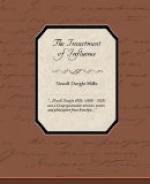This principle also has been and is the spring of all progress in humanity and civilization. Our journalists and orators pour forth unstinted praise upon the achievements of the nineteenth century. But in what realm lies our supremacy? Not in education, for our schools produce no such thinkers or universal scholars as Plato and his teacher; not in eloquence, for our orators still ponder the periods of the oration “On the Crown;” not in sculpture or architecture, for the broken fragments of Phidias are still models for our youth. The nature of our superiority is suggested when we speak of the doing away with the exposure of children, the building of homes, hospitals and asylums for the poor and weak; the caring for the sick instead of turning them adrift; the support of the aged instead of burying them alive; the diminished frequency of wars; the disappearance of torture in obtaining testimony; humanity toward the shipwrecked, where once luring ships upon the rocks was a trade; the settlement of disputes by umpires and of national differences by arbitration.
Humanity and social sympathy are the glory of our age. Society has come to remember that those in bonds are bound by them. Indeed, the application of this principle to the various departments of human life furnishes the historian with the milestones of human progress. The age of Sophocles was not shocked when the poet wrote the story of the child exposed by the wayside to be adopted by some passer-by, or torn in pieces by wild dogs, or chilled to death in the cold. When the wise men brought their gold and frankincense to the babe in the manger, men felt the sacredness of infancy. As the light from the babe in Correggio’s “Holy Night” illumined all the surrounding figures, so the child resting in the Lord’s arms for shelter and sacred benediction began to shed luster upon the home and to lead the state. To-day the nurture and culture in the schools are society’s attempt to remember the little ones in bonds. Fulfilling the same law Xavier, with his wealth and splendid talents,




